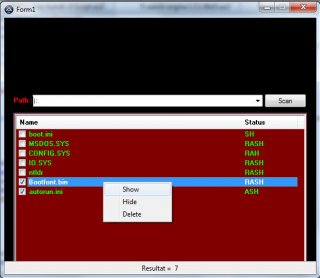Search the Community
Showing results for tags 'Driver'.
-
Hello. I did create these few functions several months ago. I post here, if it can interest someone. These functions based on WMI queries allow you to manage printers : add / delete printer, driver, port, or obtain configuration, set default printer ... I let you discover it with the code....
-
I want to print all visible files and folders in a drive to a txt file. What I mean by visible is that there are 3 files and 2 folders in this drive, but there are 500 files in the folders. I only want to print 3 files and 2 folders. I don't want the contents of the folder to be printed. please help...
-
How can I open a specific driver with Autoit, in my case I have an usb which has the driver letter of f.
-
Is there any library or api in Autoit to check whether a particular driver is signed or not and check for the certificate validity of the driver/catalog file if it is signed.?
- 3 replies
-
- certificate
- driver
-
(and 1 more)
Tagged with:
-
Process + Thread + DLL Functions UDFs Fully tested on O/S's from Windows 2000 -> Windows 7, in both 32-bit and 64-bit modes. *Note: the dropdown box in the GUI has issues in Windows 2000 - workaround - type 1st letter of process. Also, RemoteThreads may not start if Terminal Services is not instal...
-
Hey guys, I'm trying to use the delete files same time in Removable or change attrib to show. ex: delete : Autorun.inf ===> Attrib = SH in Removable this is try me : #cs ---------------------------------------------------------------------------- AutoIt Version: 3.3.6.1 Author: GHOST SKI...









